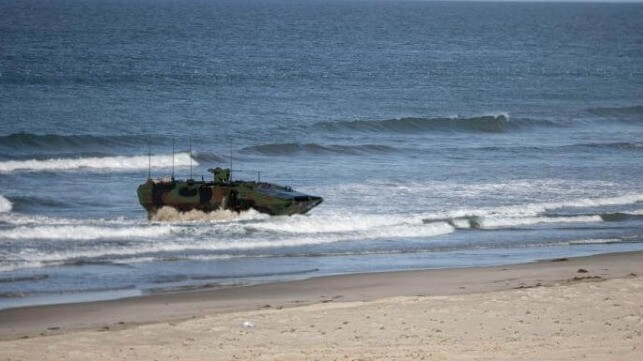Another Marine Corps Amphibious Combat Vehicle Flips in the Surf Zone

A new U.S. Marine Corps Amphibious Combat Vehicle (ACV) flipped over in surf during an exercise at Camp Pendleton, California last week, adding to the list of recent incidents with the service's amphibious vehicles.
Due to a "reported mechanical malfunction," the ACV tipped over in the surf zone during a beach landing Thursday evening. The three crewmembers inside were not harmed, but to prevent further incidents, the service has temporarily suspended ocean beach landing and launch operations. Training will continue on land and on sheltered waters.
An investigation into the cause of the malfunction is under way and "additional testing" is planned before resuming operations.
It is the second time that the Marine Corps has had to issue a pause due to difficulties in surf since this summer. In a previous incident July 17, two ACVs were headed for a beach landing zone at Camp Pendleton during a high surf advisory. The National Weather Service forecast warned of peak wave heights of up to 9-10 feet in the surf zone, and the ACV is rated for operations in wave heights of up to four feet. A video of the incident obtained by USNI News showed that one of the ACVs rolled over in the surf, and a second was overtopped by a breaking wave. The crews safely abandoned both vehicles and made it back to shore.
That earlier incident resulted in an extended suspension in landings, which was just lifted less than a month ago - and is now back in force.

that matters most
Get the latest maritime news delivered to your inbox daily.
The ACV is a derivative of the BAE / Iveco SuperAV, an eight-wheeled armored personnel carrier with amphibious capabilities. It can make six knots in water with a payload of about three tonnes. Early developmental issues in testing for the ACV included suspension component failures, according to the Pentagon's Director of Operational Testing & Evaluation.
The previous generation of Marine Corps landing vehicles, the tracked amphibious assault vehicle (AAV), has been in service since 1972 and is showing its age. On July 30, 2020, an older AAV capsized and sank during an exercise off San Clemente Island, California. The vehicle was hit by a wave and went down rapidly, leaving five crewmembers on the surface and the rest trapped inside. Eight died in the vehicle, many still wearing combat gear, and one died later of injuries sustained in the accident.
